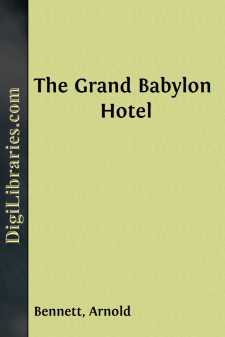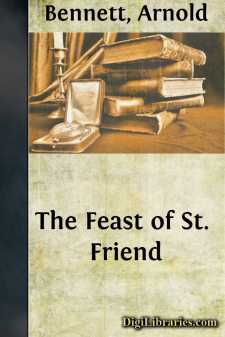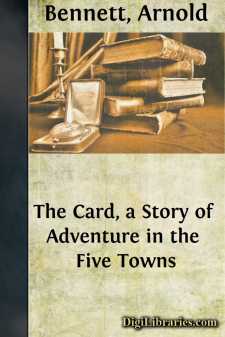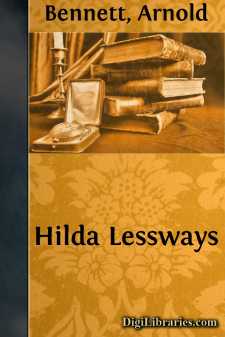Categories
- Antiques & Collectibles 13
- Architecture 36
- Art 48
- Bibles 22
- Biography & Autobiography 813
- Body, Mind & Spirit 142
- Business & Economics 28
- Children's Books 15
- Children's Fiction 12
- Computers 4
- Cooking 94
- Crafts & Hobbies 4
- Drama 346
- Education 46
- Family & Relationships 57
- Fiction 11829
- Games 19
- Gardening 17
- Health & Fitness 34
- History 1377
- House & Home 1
- Humor 147
- Juvenile Fiction 1873
- Juvenile Nonfiction 202
- Language Arts & Disciplines 88
- Law 16
- Literary Collections 686
- Literary Criticism 179
- Mathematics 13
- Medical 41
- Music 40
- Nature 179
- Non-Classifiable 1768
- Performing Arts 7
- Periodicals 1453
- Philosophy 64
- Photography 2
- Poetry 896
- Political Science 203
- Psychology 42
- Reference 154
- Religion 513
- Science 126
- Self-Help 84
- Social Science 81
- Sports & Recreation 34
- Study Aids 3
- Technology & Engineering 59
- Transportation 23
- Travel 463
- True Crime 29
Arnold Bennett
Arnold Bennett was a prolific English writer born on May 27, 1867, in Hanley, Staffordshire. He is best known for his novels set in the Potteries, a region in Staffordshire, such as "The Old Wives' Tale" and "Clayhanger," which provide a vivid depiction of life in the industrial towns of that era. Bennett's works were influential in the early 20th century, earning him a prominent place in English literature, and he was also a notable journalist and playwright.
Author's Books:
Sort by:
by:
Arnold Bennett
Chapter One THE MILLIONAIRE AND THE WAITER 'YES, sir?' Jules, the celebrated head waiter of the Grand Babylon, was bending formally towards the alert, middle-aged man who had just entered the smoking-room and dropped into a basket-chair in the corner by the conservatory. It was 7.45 on a particularly sultry June night, and dinner was about to be served at the Grand Babylon. Men of all sizes,...
more...
by:
Arnold Bennett
THE FACT Something has happened to Christmas, or to our hearts; or to both. In order to be convinced of this it is only necessary to compare the present with the past. In the old days of not so long ago the festival began to excite us in November. For weeks the house rustled with charming and thrilling secrets, and with the furtive noises of paper parcels being wrapped and unwrapped; the house was a...
more...
by:
Arnold Bennett
CHAPTER I I Edward Henry Machin first saw the smoke on the 27th May 1867, in Brougham Street, Bursley, the most ancient of the Five Towns. Brougham Street runs down from St Luke's Square straight into the Shropshire Union Canal, land consists partly of buildings known as "potbanks" (until they come to be sold by auction, when auctioneers describe them as "extensive earthenware...
more...
by:
Arnold Bennett
I The Zone Of Paris From the balcony you look down upon massed and variegated tree- tops as though you were looking down upon a valley forest from a mountain height. Those trees, whose hidden trunks make alleys and squares, are rooted in the history of France. On the dusty gravel of the promenade which runs between the garden and the street a very young man and a girl, tiny figures, are playing with...
more...
by:
Arnold Bennett
The Secret Significance of Journalism For the majority of people the earth is a dull planet. It is only a Stevenson who can say: "I never remember being bored;" and one may fairly doubt whether even Stevenson uttered truth when he made that extraordinary statement. None of us escapes boredom entirely: some of us, indeed, are bored during the greater part of our lives. The fact is unpalatable,...
more...
by:
Arnold Bennett
CHAPTER IAN EVENT IN MR. SKELLORN'S LIFE I The Lessways household, consisting of Hilda and her widowed mother, was temporarily without a servant. Hilda hated domestic work, and because she hated it she often did it passionately and thoroughly. That afternoon, as she emerged from the kitchen, her dark, defiant face was full of grim satisfaction in the fact that she had left a kitchen polished and...
more...
by:
Arnold Bennett
In the autumn of 1903 I used to dine frequently in a restaurant in the Rue de Clichy, Paris. Here were, among others, two waitresses that attracted my attention. One was a beautiful, pale young girl, to whom I never spoke, for she was employed far away from the table which I affected. The other, a stout, middle-aged managing Breton woman, had sole command over my table and me, and gradually she began...
more...
by:
Arnold Bennett
I It was an amiable but deceitful afternoon in the third week of December. Snow fell heavily in the windows of confectioners' shops, and Father Christmas smiled in Keats's Bazaar the fawning smile of a myth who knows himself to be exploded; but beyond these and similar efforts to remedy the forgetfulness of a careless climate, there was no sign anywhere in the Five Towns, and especially in...
more...
by:
Arnold Bennett
WILFRED WHITTEN'S PROSE 4 Apr. '08 An important book on an important town is to be issued by Messrs. Methuen. The town is London, and the author Mr. Wilfred Whitten, known to journalism as John o' London. Considering that he comes from Newcastle-on-Tyne (or thereabouts), his pseudonym seems to stretch a point. However, Mr. Whitten is now acknowledged as one of the foremost experts in...
more...
by:
Arnold Bennett
Chapter 1 THE PROMENADE The piece was a West End success so brilliant that even if you belonged to the intellectual despisers of the British theatre you could not hold up your head in the world unless you had seen it; even for such as you it was undeniably a success of curiosity at least. The stage scene flamed extravagantly with crude orange and viridian light, a rectangle of bedazzling illumination;...
more...











